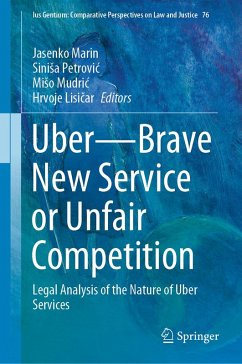This book analyzes the legal issues connected with the provision of Uber-related services. It primarily focuses on the various contractual and non-contractual relationships that occur during the use of Uber applications, especially with reference to Uber headquarters (Uber App), Uber branch offices (advertisements), Uber partner drivers (employees or self-employed), Uber application registered users, Uber transportation service users (contracting passenger) and third-party Uber transportation service users (additional passenger). It also provides a comparison of standard transportation services and contracts of carriage, irrespective of whether the carrier in question is a common carrier, contractual carrier, actual carrier or an intermediary service provider. Furthermore, the book presents the relevant case law, especially with regard to Uber as a taxi service, Uber as a share-riding service, Uber as a rent-a-car with driver service, Uber as an employer and Uber as a key organizerof transportation service, in Croatia, Belgium, Germany, Italy, the Netherlands, United Kingdom, United States, Hungary, Argentina, and France. Lastly, it explores the different legislative approaches to resolving various issues related to the appearance of Uber and similar companies - the Laissez-faire model, Status Quo model, Legal Adjustment model, and the New Legislative Paradigm model.
Dieser Download kann aus rechtlichen Gründen nur mit Rechnungsadresse in A, B, BG, CY, CZ, D, DK, EW, E, FIN, F, GR, HR, H, IRL, I, LT, L, LR, M, NL, PL, P, R, S, SLO, SK ausgeliefert werden.









